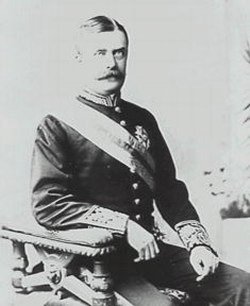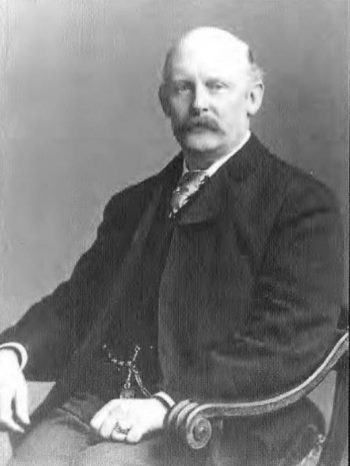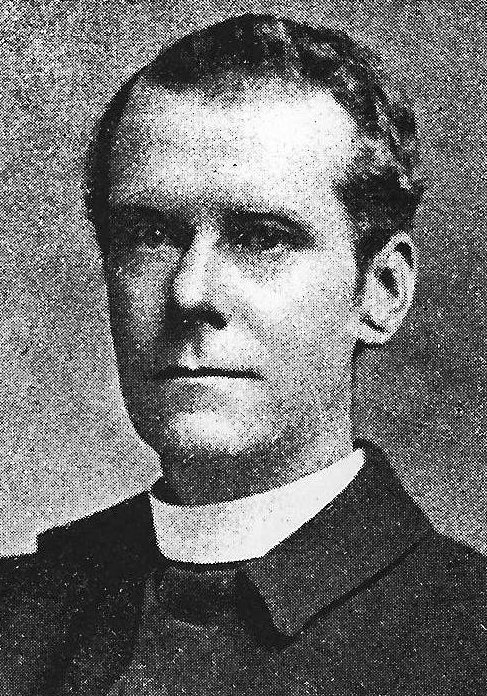Bucks Free Press – 28/08/14 (p.4)
Speeches by Sir Philip F. Rose and the Marquess of Lincolnshire
The Parish Room, Tylers Green was crowded to excess on Monday evening last when a public meeting was held, the object being to stimulate recruiting for Lord Kitchener’s New Army of 100,000 men. Sir Philip F. Rose presided, and he was supported on the platform by the Marquess of Lincolnshire, Lady Rose, Mrs E. N. N. Bartlett, Mr Dixon Davies, the Vicar (Rev. R. F. Ashley Spencer) and Mr Wigram, the latter being in military uniform. The proceedings were very enthusiastic, and before the close residents gave in their names to act as parish constables, and in other ways to assist their country in the hour of need.
Sir Philip Rose, who was cordially received, said: In view of the extreme importance of the subject on which we are met tonight I asked our noble friend and neighbour, the Marquess of Lincolnshire, to come up and speak in this district on the duty that devolves upon all able bodied young men who can do so to come forward, irrespective of class, at this supreme crisis in our country’s history, and help us fight for our very existence as an empire. (Applause). The Marquess of Lincolnshire and myself are now too old to join the Regular Forces. I well remember when the Marquess was an officer in the Royal Horse Guards (Blue), I was a full private in the South Middlesex. We did our soldiering 40 years ago, and although we are now too old for active service, we are ready to do our part to defend our country. (Applause). Let there be no mistake. We are up against a very big thing, and I am afraid that even yet the people of England do not realize the terrible danger to which this country will be exposed if the Germans should win in this struggle. (“Hear, hear”).
People are apt to say: “We have an invincible Navy and there is no danger of us being attacked”. They also say: “See what the first three weeks of war have shown. Our Navy keeps the seas whilst the German Navy is bottled up in Kiel, and our trade is being carried on whilst every German ship has been captured, or obliged to find refuge in neutral ports”. True enough, and God grant that it may continue. (Applause). But what if one foggy night the German Fleet and its horde of destroyers and submarines got out, and had the luck to destroy a number of our warships? What then? We might, whilst our regular army is engaged on land across the seas, see a really serious attempt made to raid our shores, bombard our sea coast towns (and we need hope for no mercy or any regard to the fact that they are defenceless seaside resorts from the murderous mountebank who has brought on this war), and even to land an Army Corps in England. Just fancy for a moment what it would mean if a fleet of transports were able to land 50,000 men somewhere on the East Coast. We know how Germany has treated poor helpless Belgium – how she has gone back to the dark ages in her style of war, and how she has levied impossible tributes on towns, has shot down innocent women and children on the pretence that the civilian population has fired on her troops; how she has burnt and pillaged in the most savage manner, and left utter ruin behind. Do you believe these excuses? No, it is part of her system. Why, anyone who has read the books published by German strategists knows that these writers distinctly advocate this style of warfare, and evidently the Kaiser and his war advisors endorse this infamy. (“Shame!”). Just think what it would mean if by a coup de main an Army was landed at Harwich or some other spot on the East Coast. It would at once start on its march to London, burning and destroying towns and villages, murdering in cold blood the defenceless people, and giving us in England a taste of what our desperately gallant little Belgian allies have been and are suffering. This is, believe me, no impossible picture. Shall we not prepare for any eventuality, however remote? It is the only way to win, and win we must, no matter what the cost, no matter what sacrifice in human life. (Cheers). If old England is to remain mistress of the seas, as she must or her world-wide empire must topple to the ground, she must be prepared to send her last man into the field, to spend her last sovereign, and to face all the suffering however keen it may be that the struggle will involve or England follows Rome and Babylon, and ceases to be an empire. (“Hear, hear”).
Remember, however secure may be our coasts, however gallant and watchful our sailors, this titanic struggle must in the main depend upon the success of the Allied Troops, and we must keep on feeding our fighting line, for the casualties will be heavy, and thus aid France, Belgium and Russia to hurl back the German hosts, and at the same time we must have a trained army at home to withstand any assault on our own shores. (“Hear, hear”). We have no huge horde here of trained men as the Continental nations have, where every man must serve in Army or Navy, and we must keep adding to and training an army to protect ourselves and our homes and to keep on sending men to the front and the fighting line. The new army now being formed will be a truly democratic army, as all classes of society will be in the ranks. Well to do and poor will shoulder the rifle side by side as privates. (Applause). But in such an army there will be grand chances for men to rise to N.C.O’s and officers too. (Applause). If to herself old England will be true we shall come out as victors and then we may see 100 years of peace. (Applause). The nations will take care that Prussian Emperors and Prussian Junkers no longer bluster and swagger and rattle the sabre, and talk about mailed fists and build fleets not as we do to protect a world-wide empire, but for purely aggressive purposes. Turning to the back of the building, Sir Philip pointed to the place of honour which had been given to the Belgian flag which was hanging side by side with the Union Jack and the flags of France and Russia. He had yet not been able to obtain a flag of Japan. The reference to these emblems aroused considerable enthusiasm among the audience.

The Marquess of Lincolnshire,
Charles Wynn-Carington
The Marquess of Lincolnshire, (Footnote 1) who met with a cordial reception, said Sir Philip Rose had set the case so straight before them that it was hardly necessary for him to say anything. The time for talking was over; they had now got to act. (“Hear, hear”). There was the ghastly fact that this great country was at war with Germany, and it was a war for our honour, our safety, and our preservation. He was gratified to see so many young men present that night and as men who were loyal to their King and country he asked them with all sincerity and confidence to join the Oxford Light Infantry, which was part of Lord Kitchener’s New Army of 100,000 men. They were asked to come forward to serve during the period of the war, whether it was for six weeks or years, and as soon as ever peace was proclaimed, and he prayed that it would be in a very short time, they would be able to return to their daily invocations. With all the emphasis that he could command he appealed to the young men, plucky young men, to simply do their duty and resolve to fight in the ranks for their country in her great struggle against Germany. Their Chairman had rightly told them it was to be a democratic army – all classes were to be found fighting side by side. The Prince of Wales – the heir to the Throne – had come forward (applause) – and hundreds of others were rallying to the colours. (“Hear, hear”). Lord Roseby’s son had also joined. (Sir Philip Rose: And Lord Lincolnshire’s only son has recently joined the army. (Applause)). They had, continued Lord Lincolnshire, done the best they could. One of his nephews was an admiral, and another a midshipman, and both were at present with the Navy in the North Sea. (Applause). Two sons-in-law and two nephews were also in the army with their respective regiments. Another son-in-law, who married his fifth daughter, only came home from America last week, and as soon as arrangements were complete he was joining Lord Kitchener’s Army. He expected that another nephew would be gazetted on the following day in the 5th Dragoon Guards. (Applause). He did not give those instances in any boastful spirit, but merely to show them how all classes of the community were coming forward. (“Hear, hear”). Their Chairman had also referred to the awful disaster it would be for England if Germany were to invade their shores. Ostend was only about 60 miles from Dover, and that fact showed that the enemy was not so very far off. If such a thing did happen there was no doubt the Germans would serve them as they had the gallant Belgians. They would have to grind their teeth and face it if such a terrible thing did happen. At High Wycombe recruiting was going on very satisfactorily. Up to the present time they had obtained something like 100 recruits, and he hoped those at Tylers Green and Penn would follow the example set them at Wycombe. (“Hear, hear”). As they knew, Sir Philip Rose had for some years been at the head of the Unionist party in South Bucks and he (Lord Lincolnshire) had for a great number of years fought in the ranks of the Radical party. At the present time the political sword was in the sheath. (Applause). The headquarters of the Radical party at Wycombe was being used as a Recruiting Office and the headquarters of the Unionist party in Wycombe were given over to the Distress Relief Committee. Those facts showed that they were all united to do the best they possibly could to help their country. It was their solemn duty to come forward to do what they could in defence of their country. (“Hear, hear”). While their sons were at war it would be their bounden duty to look after those at home. In the first place they would support the wives and children; then they would have the aged and infirm, and the last to be looked after would be the young men whose duty it was to go and serve this country in its great crisis. (“Hear, hear”). In High Wycombe the chair trade was practically at a standstill. Representations had already been made to the Government officials to send down orders for invalid chairs and any articles of furniture that might be required, so as to give work to those who at the present time were unemployed. It was far better to spend money on work to relieve distress than it was to give out doles. (Applause). From what had been told them that night the young men knew what their duties were. Those who were unable to volunteer for Foreign service could enrol themselves as Special Constables to guard bridges, main roads, waterworks, public buildings and railways. The news which they had that night from the seat of war was very serious. The great fortress at Namur had fallen, and the British troops and some portion of the allied forces had had to fall back on the defensive lines of France. Concluding, the Marquess renewed his appeal for all men to come forward to do their duty. (Applause).
Sir Philip Rose said it should be borne in mind that as soon as the war was over they would not be kicked out of the army. Nothing of the kind. Opportunity would be given them to continue to serve if they so desired. (Applause).
Mr Wigram referred to conditions of pay for single men who joined Lord Kitchener’s Army, viz, 1s.2d. per day and then went on to say that if in a year’s time a portion of the German Army were to march through that district he thought the young men of Penn and Tylers Green would feel ashamed that they did not respond to the call of their country. That district had done well in the past, and he was hoping that it would do so again in this critical hour. (Applause).
The Marquess of Lincolnshire then swore in Sir Philip Rose as a Parish Constable, and Sir Philip administered the oath to Mr Dixon Davies. The Marquess of Lincolnshire performed a similar ceremony in regard to the following: Rev. R. F. Ashley Spencer, Colonel Becher, Messrs Harvey Dalziel, R. F. Hayman, W. W. Wheeler, F. Spicer, H. Druce, G. Slade, C. Smith, J. C. Grove, B. Reynardson, Wm. Pusey, Robert Winter, F. Harvey, and J. White.
While the swearing-in ceremony was in progress a recruiting officer from the Oxfordshire Light Infantry was busily engaged in inducing young men to join the regiment.
Sir Philip Rose announced that he had received a short letter from their Member, Mr W. H. Du Pre who was at Bishop Stortford. Mr Du Pre announced that nearly all the Commanding Officers had volunteered for Foreign service, and he expected that he would shortly have to go to Belgium. (Applause).
The Rev. R. F. Ashley Spencer, in proposing a vote of thanks to Lord Lincolnshire, referred to the abominable lies which German writers were telling concerning their position in England. He had just received a newspaper from America, in which it was stated that they had only obtained 2,000 men for Lord Kitchener’s new army. (“Shame!”). He had been in London recently, and it was inspiring to see the young men who were anxious to serve their King and country. (Applause). Mr Spencer alluded to the serious position in which they would find themselves if Germany invaded this country. They would be called upon to pay something like £500,000,000, and in addition all their foreign trade would be gone. After urging young men to come forward and join the army, and parents to do their utmost to induce their sons to serve their King and country, the Vicar said that the Local Government Board had sent out circulars to Boards of Guardians pointing out that the wives and children of soldiers were to be first considered; then the aged and infirm, and that young men who were capable of serving their King and country were the last to receive consideration from the Guardians. (“Hear, hear”). Personally, he was glad of the decision of the Local Government Board. Concluding, Mr Spencer said he was proud of the two young men who had volunteered for Lord Kitchener’s Army – Wm. Hazell and Stanley Spicer. (Applause). All honour to those two recruits, and he prayed that God would give them a brilliant future. (Applause).
Sir Philip Rose seconded the motion, and after the resolution had been carried, and the Marquess of Lincolnshire had replied, the meeting concluded with the singing of the National Anthem.
The Rev. R. F. Ashley Spencer announced that the Union Jack and the flags of Belgium, France and Russia had been flown from the Church. He had sent for a flag of Japan, and as soon as it arrived it would be flown from the Church every day until the war was ended. (Applause).
Maude Smith’s WW1 Diary – 24/08/14. Thanks to Jon Walters and Ron Saunders.



